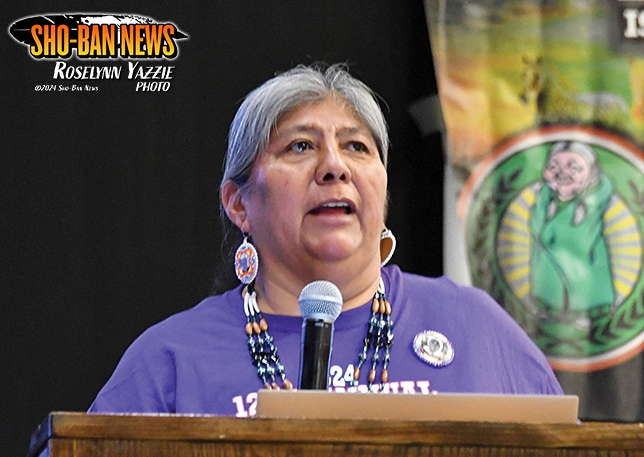Pyramid Lake Paiute Tribe film focuses on dementia awareness

Carla Eben, Numaga Senior Services Director for Pyramid Lake, Nev. at the Taking A Stand Against
Elder Abuse Conference on May 15.
By ROSELYNN YAZZIE
Sho-Ban News
FORT HALL — The 12th annual “Taking the Stand Against Elder Abuse” conference aims to educate on various topics affecting seniors, such as dementia.
The issue was presented by Carla Eben, Numaga Senior Services Director for Pyramid Lake, Nev. who showed the film, “Finding Pesa Sooname: The Pyramid Lake Paiute Tribes Story of Identity, Community, and Dementia.”
In 2017 Eben attended a training on dementia and hoarding, at the end of the session she asked if the information presented was given to Nevada tribes and Indian Country. The answer was, “Yes, but they never come.” She aims to change that.
She reached out to Indian Health Service and they didn’t provide dementia training, so she contacted the University of Nevada Reno (UNR) and with their excitement, began the journey.
She applied for the Dementia Friendly Nevada, Pyramid Lake Pesa Sooname grant in 2018. They’re the only tribe in the country to apply and be awarded the grant, which they hosted several information sessions and had the first annual Nevada Tribal Summit on Brain Health & Dementia in 2019. In 2023 they hosted a second summit after the COVID pandemic.
“We never stopped with our efforts of raising awareness in Indian Country, even though the grant ended in 2020,” she said.
In 2022 her co-facilitator with Pesa Sooname, Casey Acklin, had the idea for a film about dementia for his Master’s Thesis Class at UNR. They approached the Pyramid Lake Tribal Council for their permission to film at Pyramid Lake and the elders who volunteered. After completing the project, they presented it to the tribal council for their final approval to share with the public.
So far, they’ve had showings at the 70th Annual Society on Aging Conference and the World Alzheimer’s Conference, in addition to two viewings on the Pyramid Lake reservation and now Fort Hall.
The 34-minute feature starts with storytelling of how Pyramid Lake was formed and the history of its tribal people.
Eben talked about her grandmother, who always taught them about their origins.
The importance of elders and their teachings was emphasized while bringing up seeing families struggling to care for their loved ones who have dementia.
Those interviewed during the film talk about the need to look after and protect those with dementia. It’s said that Native families can step up and be ready to help individuals living with dementia by being educated. The elders are important to the community as they are the ones who carry the knowledge and culture. They talked about “elderhood” and how it is a noble status in the community.
Elders share thoughts on growing older and being knowledge carriers and what that means to them.
The interviewees spoke about their first experiences dealing with loved ones who had dementia. Eben talks about her grandmother, who was never diagnosed, but showed signs of forgetting who her family was. It was said it’s common that no one talks about someone having dementia, as their behavior is dismissed for them getting older. Furthermore, not many get diagnosed.
Another interviewee talked about her father who was diagnosed, but how she never heard of anyone else.
Another responded only knowing of two elders who were diagnosed with dementia.
In the film, it states that Native people are three times more likely to develop dementia.
The Alzheimer’s Association says 1 in 3 native American elders will develop Alzheimer’s or some other form of dementia. Between 2020 and 2060 the number of American Indian/Alaska Native individuals 65 and older living with dementia is projected to increase four-fold. 61 percent of Native Americans say that affordability of care is a barrier.
According to the Mayo Clinic, dementia is a term used to describe a group of symptoms affecting memory, thinking, and social abilities. The symptoms interfere with their daily lives.
Dementia generally involves memory loss, but having memory loss alone doesn’t mean you have it, as there can be other causes. Alzheimer’s disease is the most common cause of dementia in older adults, but there are many causes.
Common symptoms include memory loss; problems communicating or finding words; trouble with visual and spatial abilities; problems with reasoning or problem-solving; trouble performing tasks; trouble planning or organizing; poor coordination and control of movements; confusion and disorientation; personality changes; depression; anxiety; agitation; inappropriate behavior; being suspicious, or paranoid; seeing things that aren’t there, or hallucinations.
Eben said one of the things that bothers her most in her outreach is people are not getting diagnosed if they suspect dementia. Benefits of a diagnosis is finding out what kind you may have and also to help one plan for future care.
One lady speaks of her connection with dementia through her mother and how it affected her by allowing her to show compassion.
“We all go through things as we get older,” she said. “I think it just created more of an understanding to have more patience. Taking more time, but I really valued those last years and took my mom to as many places as I could to enjoy life and appreciate it.”
They talked about what families can do to help care for loved ones with dementia, such as being supportive, making them comfortable, not to baby them, and honor them as a person.
People living with dementia can contribute to others by sharing their personal history, some of them remember things from long ago and they may talk about it. They may also still speak the language. This is a time for young people to listen and learn from them.
The early times of when reservations were established and how they caused historical trauma were discussed. It was said there’s a connection between historical trauma and dementia.
It was explained, “As long as we have a trauma and it’s unresolved, it’s not been dealt with. People choose to forget, at least for what I see ,with Native people it really compounds that dementia and may progress to other stronger forms or serious forms of forgetfulness.”
Healing historical trauma can be done by working on wellness, which is the concept of being holistically healthy in mind, body, spirit, and heart. This must start individually and can catch on to parents who teach their children how to live well, and it may start a ripple effect.
“Pesa Sooname” was defined as to have good thought, to think with a good mind.
Some suggested ways to help people with dementia was to not have them focus on bad memories, but to make good memories, discuss concerns with them, don’t keep them hidden, be aware of the illness, and learn more about it.
Find resources available, such as faith-based organizations, the Idaho Commission on Aging, and local chapters of the Alzheimer’s Association, there’s also nonprofit organizations; local and state government or tribal services and programs; federal government resources, and paid services.
Eben said 2023 was a hard year for her, she lost her aunt, was diagnosed with breast cancer, had it removed and radiation. She was also diagnosed with Parkinson’s disease. Through it all, she never stopped working and kept a smile on her face. She’s driven by wanting to plant seeds for dementia awareness and challenged the audience to do the same, in learning about dementia, elder abuse, and fraud, and carrying the knowledge back to their communities.
“Share what you learned and watch it grow,” she said. “You don’t have to be an expert, be an advocate.”
Eben’s hope is to see more tribes join the effort to do more for their aging elders in regards to dementia services.
“Finding Pesa Sooname: The Pyramid Lake Paiute Tribes Story of Identity, Community, and Dementia” film is not available to the public yet. Eben and Acklin are considering submitting it to be viewed at upcoming film festivals.





